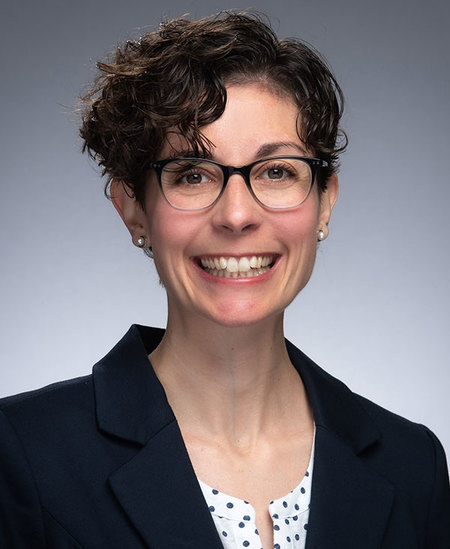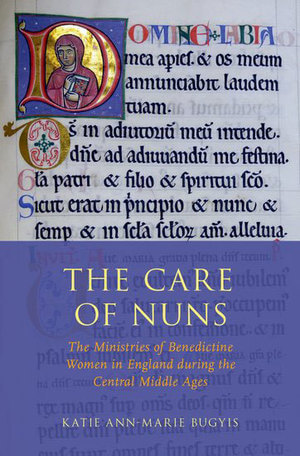 Katie Bugyis
Katie Bugyis
This Q&A is part of an ongoing series with Arts and Letters faculty. Read more Q&As with faculty members and graduate students here.
Katie Bugyis is an assistant professor in the Program of Liberal Studies, concurrent assistant professor in the Department of Theology, and faculty fellow of the Medieval Institute. She received a bachelor’s degree in history from Notre Dame, a master of arts in religion from Yale Divinity School, a certificate from the Yale Institute of Sacred Music, and a Ph.D. in medieval studies from Notre Dame.
A specialist in the history of medieval religious women and liturgical practices, Bugyis completed fellowships at the Pontifical Institute of Mediaeval Studies at the University of Toronto and Harvard University’s Radcliffe Institute before returning to the College of Arts and Letters.
Bugyis is the author of The Care of Nuns: The Ministries of Benedictine Women in England during the Central Middle Ages, as well as a number of articles and book chapters, and is co-editor of two volumes, Medieval Cantors and their Craft: Music, Liturgy, and the Shaping of History, 800–1500 and Medieval Women Intellectuals and Leaders. Two monographs, Liturgy Matters: Benedictine Women’s Communities in Medieval England and Hives of Prophets: Women Religious and the Figure of the Honeybee in the Middle Ages, are forthcoming.
How do you feel about coming back to your alma mater as a faculty member?
I am over-the-moon excited about returning to Notre Dame as a faculty member. The faculty, students — graduate and undergraduate — and library resources at Notre Dame are unparalleled. Since graduating in 2015, I have had a recurring dream about walking through the stacks of the seventh floor of Hesburgh Library and having all the books that I need for my research at my fingertips. I’m so excited to have returned to what has long been my academic and spiritual home. I am eager and committed to serve the University by helping students discover their intellectual gifts and passions.
“I am over-the-moon excited about returning to Notre Dame as a faculty member. The faculty, students — graduate and undergraduate — and library resources at Notre Dame are unparalleled.”
When did you become interested in the Middle Ages?
I have been interested in Late Antiquity and the Middle Ages since I was a child. T. H. White’s The Once and Future King was a favorite read, and I would spend all of my allowance money on books related to these two periods. I first became interested in medieval studies as a discipline in my sophomore year at Notre Dame. At the time, I was an Arts and Letters pre-health major, and I enrolled in Thomas F.X. Noble’s Late Antiquity course.
When I arrived the first day, I thought I had made a mistake, because the class was filled with seniors and graduate students in history and medieval studies. I was enraptured by Professor Noble’s opening lecture, but I still had misgivings about remaining in the course. I remember calling my mom after class, and she encouraged me to stick with it. She knew how much I loved history and suspected that this course was just the thing that I was looking for to satisfy my intellectual interests. Of course, she was right. I followed her sage advice and stayed in the course, and the rest is history.
 The Care of Nuns by Katie Bugyis
The Care of Nuns by Katie Bugyis
Professor Noble encouraged me to consider majoring in history and pursuing a Ph.D. in the field. To be perfectly honest, I was stunned by his encouragement. The idea of spending my life teaching and researching the topics that I felt most passionately about had never occurred to me. No one in my family had pursued a Ph.D. Fortunately, Professor Noble took me under his wing and provided the support and direction I needed.
How did your work as a graduate student at Notre Dame prepare you for your career path?
I knew with all of my heart that the only way I would become the kind of scholar that I aspired to be was by pursuing my doctoral studies at Notre Dame with Margot Fassler — the world’s foremost scholar of Hildegard of Bingen — and Kathryn Kerby-Fulton. I was right. They ultimately served as my co-advisers and taught me how to be a rigorous, innovative, and daring scholar. Most importantly, they have been my steadfast guides and advocates not only during my graduate studies but also after graduation. Even during the bleakest moments of the job market, they were there to cheer me on.
The research skills I acquired as a graduate student at Notre Dame are what have advanced me to this point in my scholarly career. There is no other program in medieval studies in the world that prepares its graduate students as rigorously in paleography, codicology, various ancient and modern languages (especially Latin), and historiography as Notre Dame's Medieval Institute does. My confidence in the training I received has only become stronger since graduating and interacting with other scholars in the field. I know that I can do more than simply hold my own wherever I go.
Why is the Program of Liberal Studies the best home for your teaching and research?
The Program of Liberal Studies is the best academic home for me because I am not just committed to lifelong teaching and research but also — and perhaps more importantly — to lifelong learning. I wanted to join a community of professors and students who share and champion this same commitment. It is PLS’s primary mission to cultivate such a community of learning through maintaining small classes focused on discussion, hosting social and intellectual events, and inviting inquiry in informal ways outside of the classroom.
I believe that a liberal arts education should primarily be concerned with the pursuit of questions of ultimate meaning, and that it is our responsibility as educators to help students acquire the abilities to read texts critically, to formulate articulate and thoughtful arguments, to communicate effectively, and to listen with care so as to seek to understand — and to continue refining these abilities in ourselves. Teaching in PLS encourages me to admit on a daily basis that I still have so much to learn, especially from the great thinkers of the past and from my colleagues and students, and this is just the encouragement for which I have been searching.
Throughout my academic career, I have consistently sought out interdisciplinary contexts in which to study, research, and teach because I thrive intellectually and emotionally in them. I love being in dialogue with scholars who are trained and interested in disciplines different from my own — visual artists, composers, documentary filmmakers, novelists, poets, anthropologists, chemists, mathematicians, and more. Conversations with these scholars have inspired me to pursue new lines of inquiry and have transformed the way I understand the world — past, present, and future. I feel very fortunate that such interdisciplinary inquiry is desired and inspired by the faculty and students in PLS.
“Throughout my academic career, I have consistently sought out interdisciplinary contexts in which to study, research, and teach because I thrive intellectually and emotionally in them. I love being in dialogue with scholars who are trained and interested in disciplines different from my own.”
What classes are you teaching this year, and how do you bring your research into the classroom?
This fall, I am teaching Seminar III in PLS’s Great Books sequence, which covers works from the medieval and early modern periods. In the spring, I will be teaching the first theology tutorial in PLS’s curriculum, The Bible and Its Interpretation. In these classes, I will not have the opportunity to teach directly on my research, but the way in which I teach them is directly informed by my training as a scholar of medieval Christian thought and practice.
For example, in Seminar III, I encourage students to think critically about the terms of periodization that have traditionally divided up the 13th through 17th centuries — Middle Ages, medieval, renaissance, and early modern — in part, because there is little scholarly consensus in answer to the question of when a division should be drawn. Rightly, there is concern that the imposition of a chronological division will only highlight discontinuities and thereby obscure continuities from one period to the next. Moreover, in the popular, and sometimes even in the scholarly imagination, “medieval” and “Middle Ages” were and still are equated with in-betweenness, stasis, stagnation, or worse decline and regression.
The question of periodization, then, presents thorny historiographical problems that my students and I must acknowledge and debate, because the answers we arrive at have profound ethical implications, affecting how we understand and live in our present. To foster such critical appraisal, I help my students interrogate the origins, connotations, applications, and appropriations of the traditional terms of periodization.
What makes PLS a valuable major for undergraduates?
I believe that the Program of Liberal Studies is the conscience of the University. In every course offered, professors and students join great thinkers from the past in wrestling with questions of ultimate meaning from a variety of disciplinary perspectives — the fine arts, history, literature, philosophy, politics, science, and theology. Every course in the PLS curriculum is required, which means that students cannot pick and choose their way through the course offerings to avoid a thinker, subject matter, professor, or fellow student that they disagree with or find challenging.
The program is indisputably rigorous, but its structure effectively encourages the formation of a tight-knit community of scholars who revel in spirited debate, honor the unique talents and contributions of each of its members, treasure learning as an end in itself, and recognize that the search for knowledge and understanding is a never-ending pursuit.
If you want to read great books, grapple with great ideas, learn with great teachers and students, engage in great conversations, and join a great community, then major in PLS.
“If you want to read great books, grapple with great ideas, learn with great teachers and students, engage in great conversations, and join a great community, then major in PLS.”


